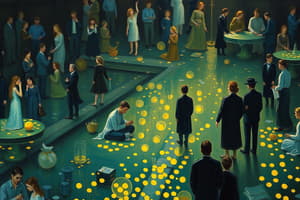Podcast
Questions and Answers
What do sociological theories focus on?
What do sociological theories focus on?
- Impact of social conditions (correct)
- Psychological influences
- Criminal intentions
- Biological factors
Who is considered one of the founders of sociology?
Who is considered one of the founders of sociology?
Emile Durkheim
What are the benefits of crime according to sociological theories?
What are the benefits of crime according to sociological theories?
Stronger societal cohesion and reinforcement of laws
What do social structure theories focus on?
What do social structure theories focus on?
Who are the main theorists behind social disorganization theory?
Who are the main theorists behind social disorganization theory?
What is social disorganization theory?
What is social disorganization theory?
What characterizes zone 1 in urban sociology?
What characterizes zone 1 in urban sociology?
Describe zone 2 in urban sociology.
Describe zone 2 in urban sociology.
What does social strain theory suggest?
What does social strain theory suggest?
What does the term anomie refer to?
What does the term anomie refer to?
What is ritualism in the context of social theory?
What is ritualism in the context of social theory?
What is rebellion in sociological terms?
What is rebellion in sociological terms?
Who are the main theorists of differential opportunity theory?
Who are the main theorists of differential opportunity theory?
What is the key idea of differential opportunity theory?
What is the key idea of differential opportunity theory?
What does social learning theory propose?
What does social learning theory propose?
What are the four elements of social control theory?
What are the four elements of social control theory?
What does labeling theory focus on?
What does labeling theory focus on?
What are primary deviance and secondary deviance?
What are primary deviance and secondary deviance?
Flashcards are hidden until you start studying
Study Notes
Sociological Theories of Crime
- Examine the role of social conditions, culture, and economic factors in influencing criminal behavior.
Emile Durkheim
- Pioneering sociologist and key figure in the founding of modern sociology.
Benefits of Crime
- Crime can strengthen societal cohesion by uniting members against lawbreakers and reinforcing rules.
Social Structure Theories
- Highlight how socioeconomic factors contribute to crime, creating conditions where individuals feel they lack legitimate success opportunities.
Social Disorganization Theory
- Proposed by Robert Park and Ernest Burgess, explaining that high residential mobility and a disorganized community lead to increased crime due to lack of cohesion.
Zones of Urban Ecology
- Zone 1: Central business district, key economic area.
- Zone 2: Transition area with deteriorating residences, often displaced by new businesses.
- Zone 3: Worker neighborhoods, where lower-income individuals reside.
- Zone 4: More affluent residential areas, marked by higher socioeconomic status.
- Zone 5: Suburban and commuter communities, often located outside urban centers.
Social Strain Theory
- Formulated by Robert Merton; asserts societal pressure creates financial comparisons among individuals.
Anomie
- Represents the disparity between societal success goals and the legitimate means available to achieve them.
Modes of Adaptation (Strain Theory)
- Conformity: Adhering to societal norms and goals.
- Innovation: Utilization of illegitimate means (crime) to achieve success.
- Ritualism: Acceptance of societal practices without pursuing mainstream goals.
- Retreatism: Withdrawal from societal goals and means, often leading to a reclusive lifestyle.
- Rebellion: Attempt to replace current societal structure with a new set of values and goals.
Differential Opportunity Theory
- Developed by Richard Cloward and Lloyd Ohlin; posits that lower-class individuals aspire to middle-class success but may lack paths to achieve it.
Double Failure
- Describes individuals who fail in both legitimate and illegitimate arenas, often resulting in marginalization.
Social Process Theories
- Focus on learned behaviors and the idea that any individual can be influenced to commit crimes.
Social Learning Theory (Differential Association)
- Advanced by Edwin Sutherland; emphasizes the idea that criminal behavior is learned through social interactions rather than innate tendencies.
Social Control Theory
- Developed by Travis Hirschi; suggests that strong social bonds prevent individuals from engaging in criminal activities.
Elements of Social Bond
- Attachment: Emotional ties to others discourage deviant behavior.
- Commitment: Investment in societal goals leads to reluctance in committing crimes.
- Involvement: Active participation in community and social activities reduces opportunities for crime.
- Belief: Respect for the law influences adherence to legal standards, unlike delinquent behavior.
Social Reaction (Labeling) Theory
- Proposed by Edwin Lemert; shifts focus from the behavior itself to societal responses and labels associated with deviance.
Primary and Secondary Deviance
- Primary Deviance: Initial acts of deviant behavior.
- Secondary Deviance: Deviance as a reaction to societal rejection, often leading to a cycle of criminal behavior.
Studying That Suits You
Use AI to generate personalized quizzes and flashcards to suit your learning preferences.




